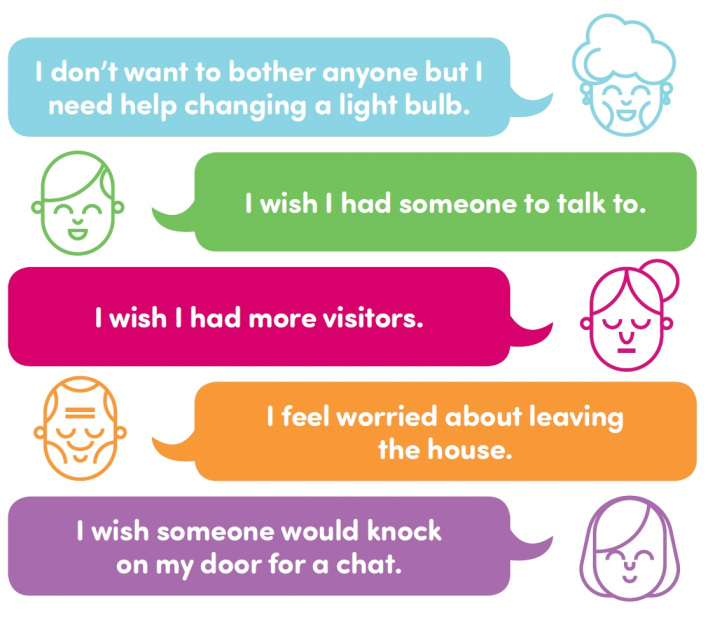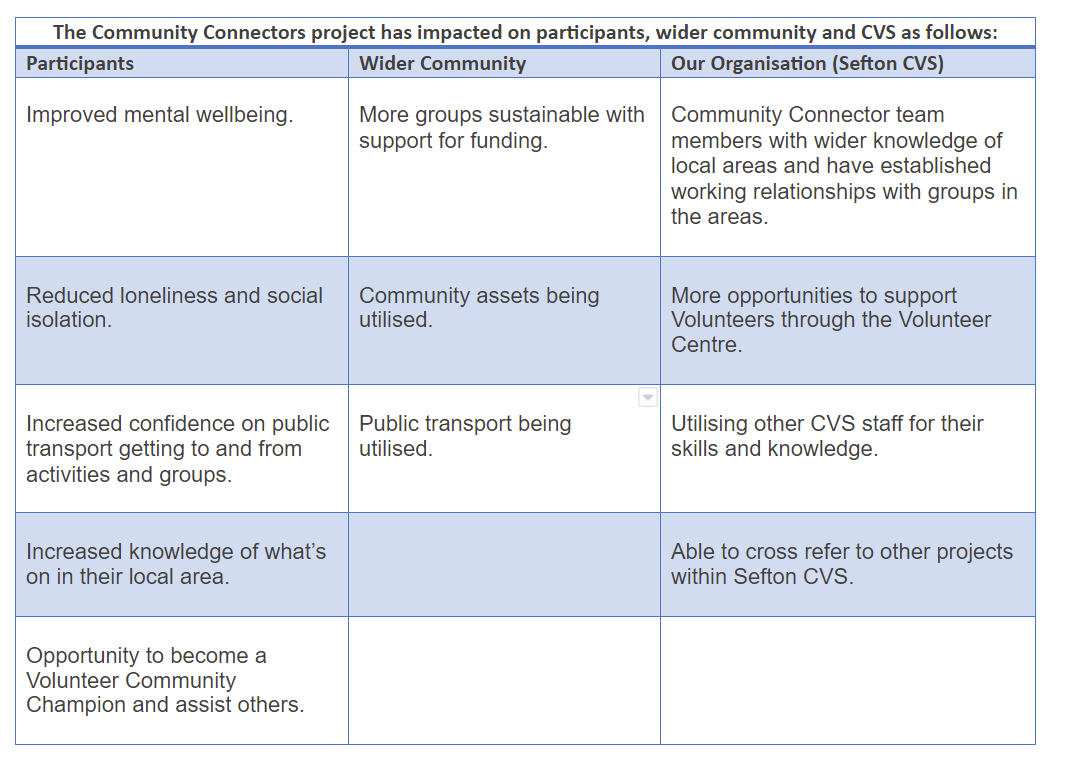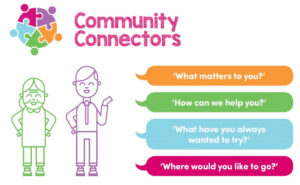Sefton Council for Voluntary Service – Community Connectors
About Community Connectors
The Community Connectors project is focussed on supporting individuals to reduce feelings of loneliness and social isolation, and improve their mental wellbeing by utilising community assets such as lunch groups, coffee mornings and other activity groups. Utilising Volunteer Community Champions, clients are given hand held supported where and when needed to access groups from their home. Community Connectors can support groups to become established or sustainable by utilising the Locality Development Officers at Sefton CVS. Some examples include setting up a free Community Connectors Coffee Morning in Maghull or supporting clients to attend Waterloo Kitchen every Thursday for a 3 course hot meal.
The Community Connectors originated as a small ‘Our Place’ prototype with asset workers located in Bootle. We wanted to expand this to a wider geography, and were successful in applying for £68,593 funding from ‘Communities Fund’, that we matched with £51,030 to run an 18 month project from June 2017 – December 2018.
During this time we were nominated by Sefton Council to act as an intern for a CLAHRC (Collaboration of Leadership for Applied Health Research and Care) evaluation of this project. This ran alongside the project itself and assisted with research, data collection and evaluation.
As the Community Connectors 18 months were drawing to a close, we were successful in being named a Community Partner for Living Well Sefton, an integrated wellness system covering the full footprint of Sefton. As a result the project is now running for a further 3 years with the potential for a further 2 years funding.
We were also successful in our application to The Big Lottery for £83,400 to fund a Maghull Together Project, which builds on the success of the Community Connector post in Maghull.
The team consists of a Coordinator and 3 full time Community Connectors who are based in Bootle, Maghull & Southport.
The purpose of the project
The purpose of the Community Connectors project is to support individuals to reduce feelings of loneliness and social isolation, and improve their mental wellbeing by utilising community assets. Working in partnership with Sefton’s Adult Social Care the project also aims to reduce the burden of inappropriate cases which are referred to them; cases which would benefit from Community Connectors input as Early Intervention and Prevention to accessing ASC in the future.
We know there are over 23,000 people over the age of 65 living alone in Sefton. We know that many of these people experience isolation and loneliness. Often these people have low level mental health needs. With limited social networks relatively minor situations can quickly escalate to crisis e.g. debts, illnesses and problems with neighbours. When in crisis many people are likely to contact public service agencies such as Adult Social Care and the Police.
The setting and context
The Community Connectors Project is managed by Sefton CVS (Council for Voluntary Service), which is an independent registered charity with a mission to promote and assist voluntary, community and faith (VCF) sector activity. Our vision is to develop a vibrant voluntary, community and faith sector that encourages and supports independent, resilient and sustainable communities.
Building on one of the examples given above, the Community Connectors coffee morning is hosted in Maghull, which is a town and civil parish in the Metropolitan Borough of Sefton with a population of approximately 25,736. There are around 7000 residents over the age of 65. The area has changed in terms of having seen an expansion as a “dormitory” town with good Motorway links and connections to Liverpool City Centre. Maghull has a bus route and 2 train stations (Maghull and the new Maghull North), and is split down the middle with the A59 dual carriageway. Despite these transport links it makes travelling within and out of the area difficult for those who don’t drive. The Maghull area was seen as an affluent area where people moved to, to start families. As children grew up and ‘flew the nest’ the parents have grown old but remained in their big houses, with little opportunity to downsize. As a result, the area now has an increasing number of older people without a lot of support infrastructure.
The approach used in the project
 The scheme built upon a pilot “asset” team located in Bootle and sought to test the model across a wider geography to see if we could adapt the approach in differing neighborhoods.
The scheme built upon a pilot “asset” team located in Bootle and sought to test the model across a wider geography to see if we could adapt the approach in differing neighborhoods.
We established Community Connectors to work in different parts of the borough providing access to:
- The wealth of knowledge, skills and resources within the community;
- communication webs (including digital media);
- community forums for collective action;
- sources of support and advice;
- connecting people to service providers
Four principles underpinned our model:
- Local by default
- Self-help
- Focus on purpose
- The IPPR report, The Generation Strain informed the approach
Who took part
By end of July 2019, there have been 580 referrals to Community Connectors. 195 of these clients were diverted away from Adult Social Care; 43 were referrals from self, family members or neighbours and the remaining 342 were referred from other organisations such as Contact Centre, GP’s, Health & Wellbeing Trainers, Macmillan Community Navigators, Merseyside Fire & Rescue Service; utilising Community Connectors as opposed to statutory services.
Most clients are aged 60+, unemployed or retired with an equal balance in gender. 106 referrals come from the Bootle locality, 79 referrals from Seaforth & Litherland locality, 197 referrals from Maghull and 198 from Southport. 99.95% of clients are White British, with the remaining 0.05% are made up of 1 German and 2 Irish clients.
516 out of the 580 referrals provided their date of birth, and a breakdown of age groups are as follows:
18-29 = 17
30-39 = 18
40-49 = 28
50-59 = 55
60-69 = 67
70-79 = 93
80-89 = 163
90-100+ = 75
By the end of July, 354 clients took up the opportunity, and 277 have completed the intervention. 96% of these recorded an improvement in their mental wellbeing, 91% recorded an improvement in feelings of loneliness and 50% recorded an increase in digital media usage for reducing loneliness (for example Skype, Whatsapp or social media).
The project impact and outcomes

From our involvement with the CLAHRC evaluation, we have produced a final evaluation report, along with an academic poster which won best poster presentation out of 15 other projects in the Partner Priority Programme Round 2 (PPP). From our involvement with CLAHRC we were nominated for an award at the Research and Innovation Awards 2019 in the ‘Research For Wellbeing’ category, and shortlisted to a finalist in the top 3.
Community Connector Academic Poster
As you can see from the ‘early findings’ section in the poster we had:
- Developed excellent working relationships with Sefton Council’s Adult Social Care and triage departments, as well as the Contact Centre (which was managed by Avarto- now managed by Sefton Council). We have now developed this even further by embedding each Community Connector in the North and South Adult Social Care teams for ½ day per week, and each Connector also listens in to live calls at the Contact Centre supporting the call handlers to divert calls to community projects, such as Community Connectors.
- 100% of clients in the Bootle locality who had completed the project at the time of the evaluation had reported reduced feelings of loneliness and social isolation, and improved mental wellbeing. Looking at an overview of the project, borough wide we have 96% with an improvement in their mental wellbeing, 91% with an improvement in feelings of loneliness and 50% who have increase in digital media usage for reducing loneliness (for example Skype, Whatsapp or social media).
- These clients were accessing over 30 different voluntary, community and faith sector groups and activities. Again we have developed this further and now the clients have been supported to attend 97 different VCF groups.
- Not all clients referred to Community Connectors from Adult Social Care are removed from their call log. In these cases Community Connectors focus on isolation issues. One huge development is the removal of the Adult Social Care call log altogether. This initially had a negative impact on Community Connectors as we were not able to view cases and divert them. However this has been developed as described above with the Community Connectors working as part of the ASC North & South teams. It also means the clients have a much smaller waiting time to be contacted.
Enablers and barriers that affected the project outcomes
Enablers
- The staff – the 3 Community Connectors have a wide range of knowledge on their areas. They have done the groundwork visiting local groups, activities and organisations finding out who attends what.
- Facilities – Sefton is a hub of activity. We haven’t had a situation where a client had a genuine interest to try a new activity or revisit something they enjoyed previously, and we couldn’t find a suitable group for them to try.
- Sefton CVS – Sefton CVS as the host organisation of Community Connectors has been flexible on adapting and changing the project to suit each area, and highly involved in supporting future funding bids.
- Sefton Council – we have managed to develop excellent working relationships with the staff within Sefton Council; particularly those within the Contact Centre, where we listen to live Adult Social Care calls 3 ½ days per month. Adult Social Care’s triage team and North & South teams where the Community Connectors now visit ½ day per week to engage and collect relevant referrals.
Barriers
- Volunteers – Although we’ve had 98 people register their interest as a Volunteer Community Champion this hasn’t been without complications. Many of these Champions have been vulnerable adults themselves, and we had to take decisions to not match these up with other vulnerable adults who were clients. As a result, alternative roles were found for these volunteers.
- Funding – uncertainty over the project’s future meant we lost a member of staff in September 2018. Shortly after this we secured funding via Public Health for Living Well Sefton and The Big Lottery.
Key learning – advice to others starting projects
 Speak to organisations who have set these projects up first and learn from their experience.
Speak to organisations who have set these projects up first and learn from their experience.- Do your research first. As well as reading the likes of ward profiles, speak to real residents and get their experience of their local area; what do they like, what is missing, how do people communicate with each other?
- Set up a small pilot in one area; find out what works well and what doesn’t work well before expanding into a larger geographical area.
- Be prepared to adapt and change your project for different areas. Different areas have different demographics; what works well in one area could fail in another and vice versa.
Next steps and sustainability
The Community Connectors Project is now funded for the next 3 years, with the possibility of an additional 2 years funding. Part of the Maghull Together project is to provide training and resources to VCF sector groups which will enable them to run their groups for prolonged periods of times. We are also in the process of upgrading our VCF Direct; an online directory consisting of over 3000 activities in Sefton. The upgraded version will include a referral platform whereby groups can refer interested clients to each other.
How was the information collected for this case study
The data and information is collected on a monthly basis and board reports are produced for Sefton CVS. The data is collected during home visits with the clients once the client gives consent to take part. The project has been evaluated by CLAHRC as part of the Partner Priority Programme Round 2, and has also been supported by SQW to produce a cost benefit analysis. Both documents can be found at the end of the case study.
Further information
Community Connectors Twitter account
CLAHRC final evaluation report. Please ask for appendices to be sent if required.
Gina Harvey, Community Connectors Coordinator is willing to share learning from this project with other similar projects, or those wanting to set up similar work.

